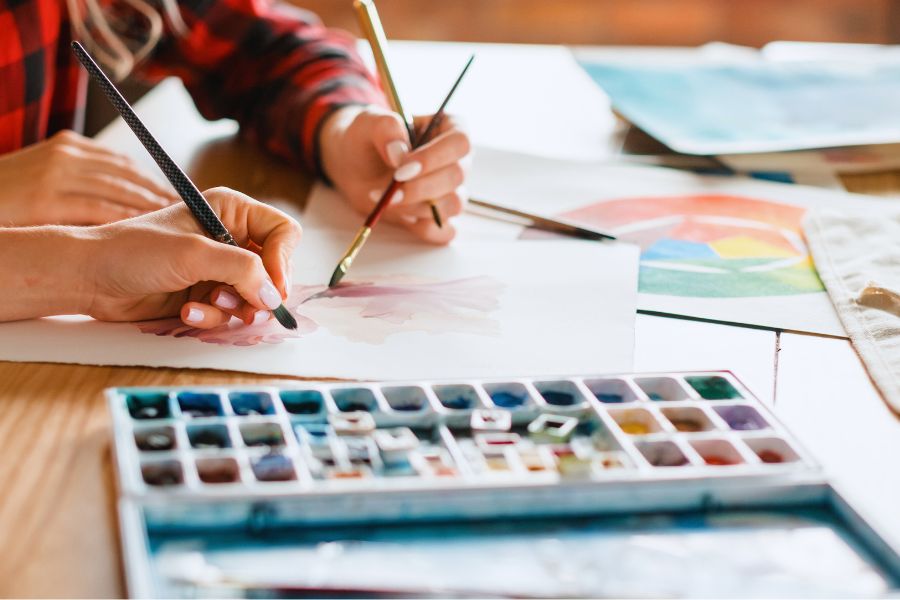Art Therapy for Addiction Recovery
Using Media and Multimedia to Support Successful Sobriety
To combat an addiction, a lot of people begin with detox and then complete a range of therapies and treatments at rehab. One of the most important methods of recovery is one-on-one therapy, which often includes addiction treatment art therapy.
But why is art therapy for addiction recovery so widely used, and is it effective?
Perhaps you have been to rehab and know that incorporating art therapy into addiction treatment programs provides a creative outlet for emotional expression and promotes self-awareness and self-esteem. Or maybe you are an interested outsider, or someone with a loved one battling substance abuse.
This individualized approach is flexible, customizable, can address the causes of addiction, and seeks to identify solutions that work for the long term. Our latest guide from SOBRLIFE will dig deeper to see why art therapy is a core element of addiction recovery for many of us in the sober community.
Develops a Meaningful Relationship Between Therapist and Client

In a group environment, it can be tough to feel a close connection with anyone, and art therapy can be a way to breaking down barriers and helping foster social bonds. While some patients thrive in the group dynamic, others want it to be more personal.
Individual therapy, whether in an art therapy session or otherwise, allows each patient to create a meaningful relationship with his or her therapist or counselor, including an art therapist.
In a one-on-one therapy session, patients and therapists can really get to know one another. In just a few hours or sessions, the dynamic will be established, and painting, drawing, or even collage work can be a huge part of this.
Often, patients find it easier to open up to someone they know. Forging that relationship can be a great way to get the ball rolling.
Art Can Address the Root Causes of Addiction Recovery
It’s not enough to break the physical dependence on drugs or alcohol, that is not the entirety of the recovery process. The best addiction recovery will also work to find the root cause of addiction, and for that matter, the roots of relapse as well. By addressing that, it will be easier to prevent addiction from ever taking hold again.
Art therapy techniques can help in exploring the root causes of addiction by facilitating self-expression and emotional exploration.
Many different factors can lead to the development of addiction. Sometimes, these factors are obvious. In most cases, however, they have to be shared by the client. That’s why it is so important for all people in a treatment setting to have the opportunity to communicate with a capable art therapist in a one-on-one setting, at least occasionally.
Trauma and Speaking Through Creating Art
Some people might reveal early childhood trauma, or they might have been victims of abuse later in life. Art therapy can be an approach that uses trauma-informed practices, much like trauma based motivational interviewing adopts and incorporates this model to adapt its core offerings.
Other clients might struggle with mental health problems. Still, others might acknowledge that financial or work-related stress is their biggest struggle.
Integrating art therapy allows for a way of addressing these taboo or ‘untouchable’ topics without charging into them head-on.
Recognizing and identifying these factors is the first step to addressing them. Once they are out in the open, it will be easier to get the right help and treatment.
Some people will benefit from behavioral therapy, others will need extensive talk therapy and still more might want to consider recreational therapy for stress relief. Before the right choices in ongoing aftercare can be made, therapy needs to get to the underlying ‘propellants’ of our addictive behaviors.
Artistic Expression Yields Personal and Sensitive Discussions

There are many times during addiction treatment when we might want to discuss sensitive or personal topics. Art therapy sessions provide a safe space for personal and sensitive discussions. While it is possible to introduce these issues in a group therapy session, most people won’t feel comfortable doing so. In individual therapy, whether art or otherwise, patients will have the opportunity to share openly without judgment.
Therapists are trained to help, not judge. That’s important, because many clients want or need to share experiences in their past that aren’t pleasant. They may feel guilt about past actions or they might have suffered while in the throes of addiction. These are personal issues, and few people want to share stories of abuse, sexual assault, relationship drama or serious medical problems in a big group.
Nonetheless, many people need to divulge this information in order to experience closure or peace of mind. It is often only through an individual therapy session that individuals feel comfortable enough to disclose these highly intimate details.
A High Degree of Confidentiality
Many of us who go through addiction treatment feel as if our privacy has been taken away from us. A trained art therapist can ensure confidentiality, creating a safe space for individuals to express themselves. It is important to regain that sense of dignity in recovery.
Sometimes, clients want or need to discuss things privately, and individual therapy is the best way to accomplish that.
Most group therapy sessions indeed encourage anonymity. Nonetheless, it is harder to feel that in a large group. When people are discussing their marriage, their fears about child custody battles, their struggles with self-esteem, or their concerns about overdose, privacy is important. Confidentiality is easier to guarantee in a one-on-one environment with just one therapist and one patient.
Customizable and Flexible Format
One of the best things about individual therapy is that it can perfectly fit the needs and the schedule of the individual getting treated. The creative process in art therapy can be customized to fit the unique needs of the person, allowing for a personalized approach to emotional healing and personal growth. The topics are flexible, and there is the opportunity to fluidly move from one issue to another.
Plus, the duration and scheduling of sessions are easier to arrange. Group therapy tends to have either a specific focus, or it is fluid and lets everyone discuss the issues that are important to them. Unfortunately, this means that some of us might not need or want to discuss those issues at that moment. In individual therapy as well as art therapy, clients can direct the conversation.
If a certain issue is pressing, that area can get 100 percent of the focus during that particular session.
Opportunities for Learning Personal Coping Mechanisms
One of the keys to relapse prevention is identifying triggers and developing valuable coping skills. These are highly individual and therapy is often the best time to learn more about them. Triggers are moments when something sparks a serious craving for drugs or alcohol. It can be stress, sickness, or a lack of confidence.
In therapy, we learn to recognize these triggers and address them directly. Coping mechanisms are unique for every single one of us.
Often, they are a form of distraction. Having a snack, drinking a bottle of water or even going for a walk can all help. In other cases, the best way to cope will be to meet with a counselor, a mentor or a friend. In therapy, patients can practice identifying and choosing coping mechanisms, a skill that can go a long way in preventing a relapse in the years to come.
Drawing a Vision Board and Specific Plans for the Future

After addiction, it can be challenging to make any kind of concrete plans for the future. However, being prepared is key to lasting sobriety. Art therapy plays a crucial role in the recovery journey by facilitating emotional healing, self-awareness, and coping mechanisms.
During art therapy, people will be able to talk about their goals and how they plan to proceed on their journey to recovery and still live a full life. Individual therapy and art therapy are undoubtedly one of the keys to recovery. During and after detox, individual therapy can play an important role in the battle of maintaining sobriety.
The Latest in Recovery Resources Live at SOBRLIFE
We hope our latest guide has shown how art therapy can help break through barriers and allow us to process complex emotions we might not otherwise have been able to get to. In a lot of ways it opens up those in recovery to be better advocates, and we hope they too choose to embrace the ‘recover out loud‘ movement we endorse heartily here at SOBRLIFE.
For all of us, but especially for those in recovery from a substance use disorder, art therapy offers a way of expression that can be freeing, not to mention creative (and often, fun as well!)
For news on not just art therapy techniques, but everything related to recovery and living the sober life, keep your browser locked to the SOBRLIFE blog and visit us daily!
